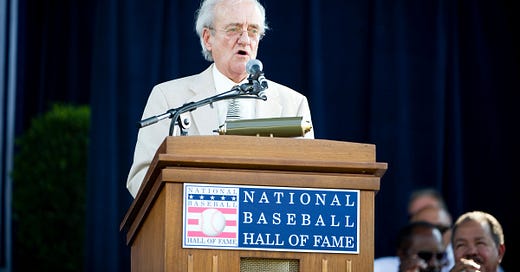
Discover more from Warning Track Power
Welcome to Warning Track Power, a weekly newsletter of baseball stories and analysis grounded in front office and scouting experiences and the personalities encountered along the way.
Baseball lost one of its heroes this week. The world lost a true gentleman.
Roland Hemond, who worked in professional baseball for 70 years, passed away on Monday at the age of 92. He impacted so many lives along the way that his three Executive of the Year honors are more parenthetical than career defining.
I was lucky enough to work with Roland for four years in Arizona. By this point, he was already in his 80s. He had seen more baseball than anyone in the office, yet the promise of another game seemed to renew his enthusiasm daily.
In his seventh decade in baseball, Roland cherished the role of town elder. He had stories to tell, and I usually walked by his office several times a day. He always welcomed the company.
Roland had served as general manager of the Orioles from 1988 through 1995. He was the first GM I had ever heard of, and he was responsible for assembling the teams I rooted for during my teenage years. Every conversation with him could become a journey back to my youth. I think that’s how Roland wanted everyone to interact with the game — with the joy and innocence of a kid cheering at the ballpark on a Sunday afternoon.
Roland often stressed how important it was to celebrate the victories. He pointed out how hard everyone took losses. He was right in this assessment; the pain of a loss was felt far greater than the joy of a win. Roland wouldn't stand for that.
I remember when he once publicly celebrated the D-backs first-place standing at a seemingly inconsequential point in the summer. Cynics would note that they don’t give out trophies in July.
Why is he doing this, I wondered.
Because it wasn’t inconsequential to him. Roland wasn’t concerned about upsetting the baseball gods or generating bulletin board material for the rest of the division. He didn’t live in fear of what others might think. He enjoyed the moment. He lived for the joy generated by the game.
Roland became genuinely concerned when he saw team employees so distraught after a loss. He was the antidote. Roland made us appreciate the good times, and he always had a clever way of putting struggles in perspective. (His 1983 White Sox began the season 16-24. They finished 99-63, winning the AL West by 20 games. He always believed it could happen again.)
Roland enjoyed the moment. In fact, I think Roland became the moment. His exuberance belonged to everyone. I was in the right place at the right time to watch as Roland’s path to immortality was paved in Arizona.
There was a conference room at the Spring Training complex named in his honor. There’s an annual award given to a D-backs scout in Roland’s name. Ultimately, the scout section at Chase Field was named for him — all while he was alive!
Roland’s canonization was televised.
In 2011, Roland became the second recipient of the Buck O’Neil Lifetime Achievement Award, presented by the Hall of Fame’s Board of Directors.
Later that season, on a night after an exciting win, Roland made his way into my office with no idea what was waiting for him: my parents.
For an hour, Roland regaled us with stories from the Milwaukee Braves to Cooperstown. I believe it was my mother who asked him if he had received anything from the Hall of Fame to commemorate his recent honor. Roland excused himself and returned a couple minutes later carrying a (heavy) statue of Buck O’Neil.
We all felt the way that hockey fans must when in the presence of the Stanley Cup. I couldn’t believe the statue was resting on my desk, unceremoniously atop a waiver bulletin and organizational scouting assignments.
Roland loved the chase. The same twinkle appeared in his eye whether he was talking about courting his wife, Margo, or reliving the secretive process of sending offers via telegram to Henry Aaron and ultimately signing him for the Boston Braves.
Roland got a thrill out of mischief, too. Once again, that twinkle would return. One day, I was in his office expecting to hear about Bill Veeck or Carlton Fisk. Instead, it was Ol’ Blue Eyes.
Roland had found himself invited to a black-tie event in a Los Angeles hotel with some of his Angels colleagues, including team publicist George Goodale, who also served as Gene Autry’s press agent. While they were waiting (where exactly and for what, I was never sure), someone suggested that they have a drink.
Roland saw a bottle of Chivas Regal, and he had a glass. Soon after, Frank Sinatra appeared and demanded to know who had opened his scotch.
Goodale identified the culprit, and Roland soon found himself on the business end of one of Sinatra’s infamous tirades.
He mentioned the profanity, shrugged it off, and then told me about how the ’83 White Sox really started humming once they moved Fisk into the 2-hole.
Here’s to you, Roland. Thank you.
Thank you for reading Warning Track Power. Subscribe now to have WTP delivered to your inbox every week without interruption.
Subscribe to Warning Track Power
Baseball stories and short essays celebrating the characters from a career in MLB and deepening our relationship with the game.





Beautifully written piece, sir. Makes me wonder if you’re going to string together some of these memories into a longer compilation someday. Save an autographed copy for me.